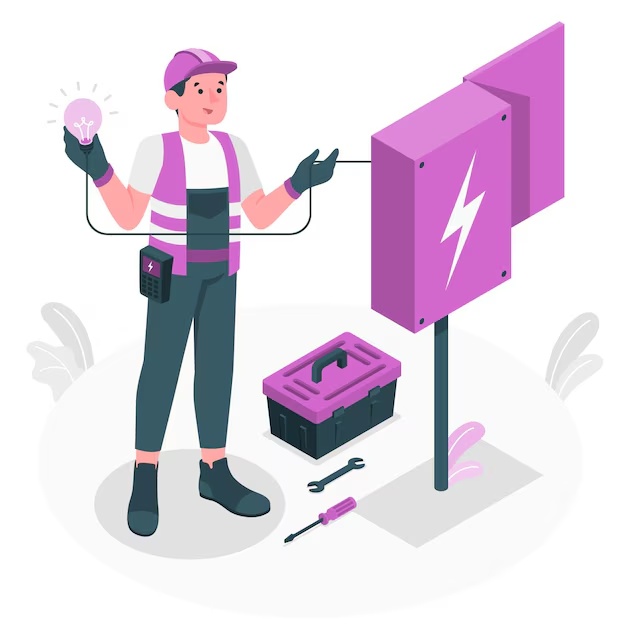One of the most common causes of electrical fires is overloaded circuits. When a circuit is required to deliver more electricity than it is designed to handle, it overheats, increasing the risk of fire. Understanding how to identify overloaded circuits in your home is essential to prevent potential hazards. In this post, we’ll discuss how to recognize the warning signs of circuit overload, ways to prevent it, and how Jinnie can help you safely manage your electrical system.
What is a Circuit Overload?
Each electrical circuit in your home is designed to handle a specific load of electricity. When the total wattage of appliances and devices plugged into a circuit exceeds this capacity, it causes the wiring to heat up, which can lead to sparks, short circuits, or even fires. Overloading typically occurs when too many high-powered devices are connected to a single circuit or when older electrical systems cannot meet the demands of modern appliances.
Signs of an Overloaded Circuit
Knowing the warning signs of an overloaded circuit can help you address the issue before it leads to a more serious problem. Here are some common indicators:
- Flickering or Dimming Lights If the lights in your home flicker or dim when you turn on certain appliances, this may indicate that the circuit is overloaded. The excess demand on the circuit is drawing power away from other devices, causing the lights to flicker.
- Frequent Circuit Breaker Trips Your circuit breaker is designed to protect your home from electrical overloads. If it trips frequently, especially when multiple appliances are in use, it’s a sign that the circuit cannot handle the load. While the breaker helps prevent fires, constantly resetting it isn’t a long-term solution and points to an underlying issue.
- Buzzing or Humming Sounds from Outlets If you hear a buzzing or humming noise coming from your outlets, it could indicate that the circuit is under stress. This sound is often caused by electrical arcing, which occurs when the flow of electricity is interrupted by an overloaded or faulty circuit.
- Burning Smell or Warm Outlets A burning smell near your outlets or switches is a serious warning sign of circuit overload. This often means that the wiring behind the outlet is overheating, which can lead to a fire. If your outlets feel warm to the touch, it’s a sign that the circuit is under strain and could become a fire hazard.
- Sparks or Smoke Seeing sparks when plugging or unplugging appliances is a clear indication of a circuit problem. If you notice smoke or sparks coming from an outlet, turn off the power to that circuit immediately and call a professional.
How to Prevent Circuit Overload
Preventing circuit overload involves managing the number and type of devices connected to each circuit. Here are some practical tips to help you avoid overloading your home’s electrical system:
- Understand Your Home’s Electrical Capacity Each home has a limited electrical capacity, which is measured in amps. Understanding your home’s capacity and how much electricity each circuit can handle is the first step in preventing overload. You can refer to your circuit breaker panel to identify the amperage of each circuit, or consult Jinnie for a professional assessment of your electrical system.
- Distribute Electrical Load Across Multiple Circuits Avoid plugging too many high-powered devices into a single outlet or circuit. Large appliances like refrigerators, air conditioners, and microwaves should be on dedicated circuits to ensure they do not overload shared circuits with smaller devices.
- Use Power Strips with Built-in Circuit Breakers Power strips with built-in surge protectors and circuit breakers help distribute electricity safely across multiple devices. If a circuit begins to overload, the breaker will trip and prevent overheating.
- Avoid Daisy-Chaining Power Strips Connecting multiple power strips together (daisy-chaining) is a common cause of circuit overload. Instead of relying on power strips to extend the capacity of a single outlet, spread out your appliances across different circuits or outlets.
- Upgrade Your Electrical System Older homes are often equipped with electrical systems that are not designed to meet the high power demands of modern households. If you frequently experience overloaded circuits, it may be time to upgrade your electrical panel. Jinnie can help you assess whether your home needs additional circuits or a panel upgrade to safely handle your current and future power needs.
- Unplug Devices When Not in Use To reduce the load on your circuits, unplug devices that are not in use. Appliances like coffee makers, toasters, and hairdryers still draw power even when turned off, contributing to the total load on the circuit.
How Jinnie Can Help You Manage Circuit Overload
Preventing circuit overload is essential for protecting your home and family from electrical fires and other hazards. Jinnie offers a range of services to help ensure that your home’s electrical system is safe and up to date:
- Circuit Breaker Inspection and Upgrades: Jinnie’s professional electricians can inspect your circuit breakers to ensure they are functioning correctly and capable of handling your home’s electrical demands. If necessary, we can upgrade your electrical panel to add more circuits or increase capacity.
- Electrical Load Assessment: Jinnie can perform a comprehensive electrical load assessment of your home to determine whether your current system can handle the power demands of modern appliances. We’ll provide recommendations for redistributing load or upgrading your system as needed.
- Outlet and Wiring Upgrades: If your outlets or wiring are outdated or showing signs of stress, Jinnie can replace or upgrade them to prevent overloads and enhance safety.
Conclusion: Protect Your Home from Circuit Overload
Recognizing the signs of an overloaded circuit and taking proactive steps to prevent it can save your home from dangerous electrical fires. By distributing your electrical load properly, upgrading your system as needed, and keeping an eye on warning signs, you can ensure that your home remains safe and efficient. Jinnie is here to help you every step of the way with professional electrical services, from load assessments to panel upgrades.
If you’re concerned about the safety of your home’s electrical system, contact Jinnie today to schedule an inspection. Let us help you prevent circuit overload and ensure your home is equipped to handle all your electrical needs safely.



